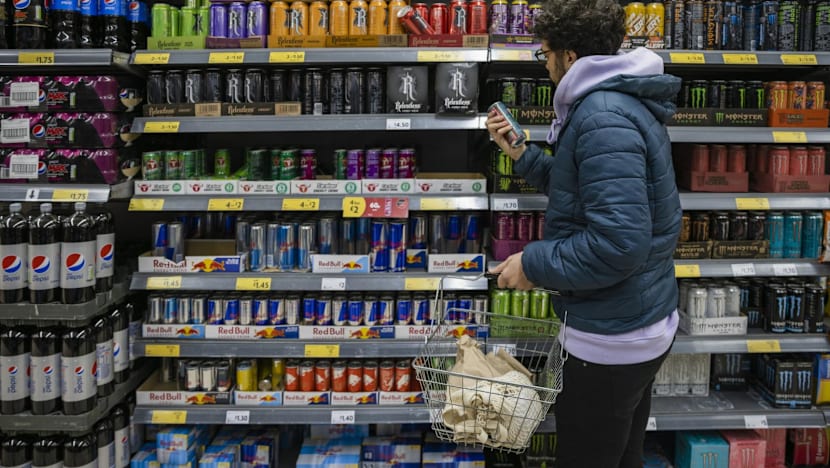World
UK Proposes Ban on High-Caffeine Energy Drinks for Under-16s

The UK government has proposed a ban on the sale of high-caffeine energy drinks to individuals under the age of 16. This initiative targets sales in shops, restaurants, cafes, vending machines, and online platforms. Announced on September 2, 2023, the government aims to consult on this ban due to the negative impacts these drinks have on children’s physical and mental health.
The proposed regulation would make it illegal to sell energy drinks containing more than 150 mg of caffeine per litre to anyone under 16 years old. Notably, lower-caffeine beverages, including soft drinks, tea, and coffee, are excluded from this restriction.
Concerns Over Health Impacts
The Department of Health and Social Care highlighted increasing evidence linking high-caffeine drinks to a range of harmful effects on children. These include disrupted sleep, heightened anxiety, poor concentration, and diminished educational outcomes. The department noted that approximately 100,000 children in the UK consume at least one high-caffeine energy drink daily.
Brands such as Monster, Red Bull, Prime, and C4 are among those that would be affected by the ban. The government claims that implementing this regulation could prevent obesity in up to 40,000 children. While many major retailers already limit the sale of these products to minors, smaller convenience stores may still sell them freely, indicating a need for a consistent approach across the board.
A consultation process commenced on the same day as the announcement, set to last for 12 weeks. It seeks input from health experts, educators, retailers, manufacturers, local enforcement authorities, and the public on the proposed ban.
Support from Experts and Officials
Health and Social Care Secretary Wes Streeting remarked, “By preventing shops from selling these drinks to kids, we’re helping build the foundations for healthier and happier generations to come.” He emphasized that the government is shifting its focus from treatment to prevention, responding to concerns expressed by parents and educators about the root causes of poor health and educational performance.
The press release indicated that nearly a third of children aged 13 to 16 and around a quarter of children aged 11 to 12 consume at least one high-caffeine energy drink weekly. The Department of Health and Social Care advocates for immediate action to enhance children’s wellbeing, stating it will provide them with a better start in life and reduce the risk of long-term health issues.
Experts have also expressed support for the ban. Amelia Lake, Professor of Public Health Nutrition at Teesside University, stated, “Research has shown the significant mental and physical health consequences of children drinking energy drinks… and have shown that these drinks have no place in the diets of children.”
Moreover, Professor Steve Turner, president of the Royal College of Paediatrics and Child Health, described the ban as “the next logical step” in improving children’s diets in the UK. He emphasized that children and teenagers do not require energy drinks, as they can obtain necessary energy from adequate sleep, a balanced diet, regular exercise, and meaningful connections with family and friends.
The UK government’s proposed ban on high-caffeine energy drinks represents a significant step towards prioritizing children’s health and addressing the growing concerns associated with these products. The upcoming consultation will play a crucial role in shaping the future of this legislation.
-

 World5 months ago
World5 months agoSBI Announces QIP Floor Price at ₹811.05 Per Share
-

 Lifestyle5 months ago
Lifestyle5 months agoCept Unveils ₹3.1 Crore Urban Mobility Plan for Sustainable Growth
-

 Science4 months ago
Science4 months agoNew Blood Group Discovered in South Indian Woman at Rotary Centre
-

 World5 months ago
World5 months agoTorrential Rains Cause Flash Flooding in New York and New Jersey
-

 Top Stories5 months ago
Top Stories5 months agoKonkani Cultural Organisation to Host Pearl Jubilee in Abu Dhabi
-

 Sports4 months ago
Sports4 months agoBroad Advocates for Bowling Change Ahead of Final Test Against India
-

 Science5 months ago
Science5 months agoNothing Headphone 1 Review: A Bold Contender in Audio Design
-

 Top Stories5 months ago
Top Stories5 months agoAir India Crash Investigation Highlights Boeing Fuel Switch Concerns
-

 Business5 months ago
Business5 months agoIndian Stock Market Rebounds: Sensex and Nifty Rise After Four-Day Decline
-

 Sports4 months ago
Sports4 months agoCristian Totti Retires at 19: Pressure of Fame Takes Toll
-

 Politics5 months ago
Politics5 months agoAbandoned Doberman Finds New Home After Journey to Prague
-

 Top Stories5 months ago
Top Stories5 months agoPatna Bank Manager Abhishek Varun Found Dead in Well









